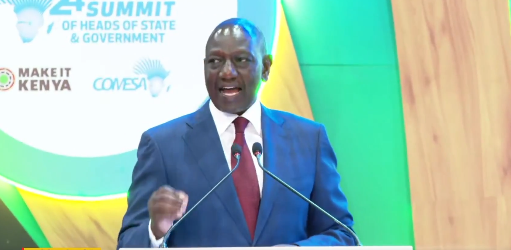

President William Ruto has pledged to drive the intra-African trade growth agenda as the continent navigates turbulence from shifting global policies, which are threatening to hurt Africa’s exports to the world.
Ruto who yesterday assumed the chairmanship of the Common Market for Eastern And Southern Africa (Comesa), taking over from his Burundi counterpart Evariste Ndayishimiye at the 24th Summit of Heads of State and Government, strongly advocated for digitisation and removal of trade barriers to drive intra-Africa trade.
Global trade policy is undergoing a significant shift towards rising protectionism, industrial policies and uncertainty, driven by factors like advanced economies' focus on economic security and climate goals and a departure from World Trade Organization (WTO) principles by the US.
While African states have access to global markets such as EU and Asia, with individual countries having in place bi-lateral agreements, uncertainty around the likes of the African Growth and Opportunity Act (AGOA) which expired on September 30, and trump tariffs have brought a new world trade order, sending countries back to the drawing board.
These changes include increased and differentiated tariffs, sectoral restrictions, disruption in global value chains with potential harm to vulnerable economies, as countries respond with their own trade measures.
The Nairobi Comesa Summit declaration, which will forge conversations for the next two years, include boosting agricultural productivity through smart agriculture, breaking barriers through trade and investment digitisation and enhancing trade through digital transformation of logistics and transport.
Ruto noted that intra-Comesa trade, though improving, still accounts for a small share of our total trade.
“Africa contributes only three per cent to global trade, and only 14 per cent to intra-Africa trade. We must move from competition to collaboration, from exporting raw materials to building value chains that retain wealth within our borders,” he said.
He said the Comesa bloc, and Africa at large, must move decisively to digitalise every aspect of trade facilitation by investing jointly in physical and digital infrastructure, modern transport corridors, regional data centres and secure cloud services.
The Comesa chairman has also called for the adoption of electronic Certificates of Origin, integrated Single Window Systems and interoperable cross-border payment platforms, to make the Comesa region the most efficient place to trade on the continent.
The continent, he said, must also leap into the Fourth Industrial Revolution by integrating automation, artificial intelligence and advanced manufacturing.
“This is how we will transform our rich mineral and agricultural resources into high-value finished products within COMESA, creating quality jobs, boosting incomes, and expanding our economies,” he said.
The Nairobi summit centred on driving intra-African trade, including through regional trade blocs, as the continent seeks to become self-sustainable on trade under the African Continental Free Trade Area (AfCFTA).
Africa's total merchandise trade reached $1.5 trillion (Sh193.8 trillion) in 2024, a 13.9 per cent surge from 2023, while intra-African trade reached $220.3 billion (Sh28.5 trillion) in 2024.
Secretary General Wamkele Mene yesterday said 24 countries are already trading under the AfCFTA rules, which played a key role in pushing up trade numbers last year.
However, intra-African trade remains low compared to Europe's roughly 60-70 per cent and Asia's 50-70 per cent, with the disparity highlighting Africa's challenge in achieving regional integration and global competitiveness.
African Union chairman Mahmoud Youssouf called for
increased adoption of AfCFTA.
“This will help us build a resilient intra-Africa trade. We need to implement all required instruments for the implementation of AfCFTA,” he said during his address.
The Nairobi Summit saw all attending member states, including Eswatini, Zimbabwe, Ethiopia and Egypt, commit to simplifying trade rules for growth.


![[PHOTOS] Ruto hosts Comesa heads of state dinner](/_next/image?url=https%3A%2F%2Fcdn.radioafrica.digital%2Fimage%2F2025%2F10%2F838389a1-d072-49b2-ae32-f66283a991e2.jpg&w=3840&q=100)











